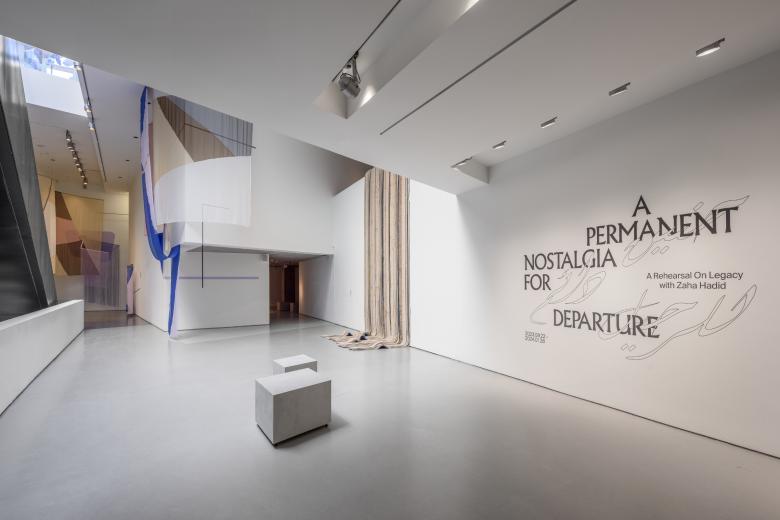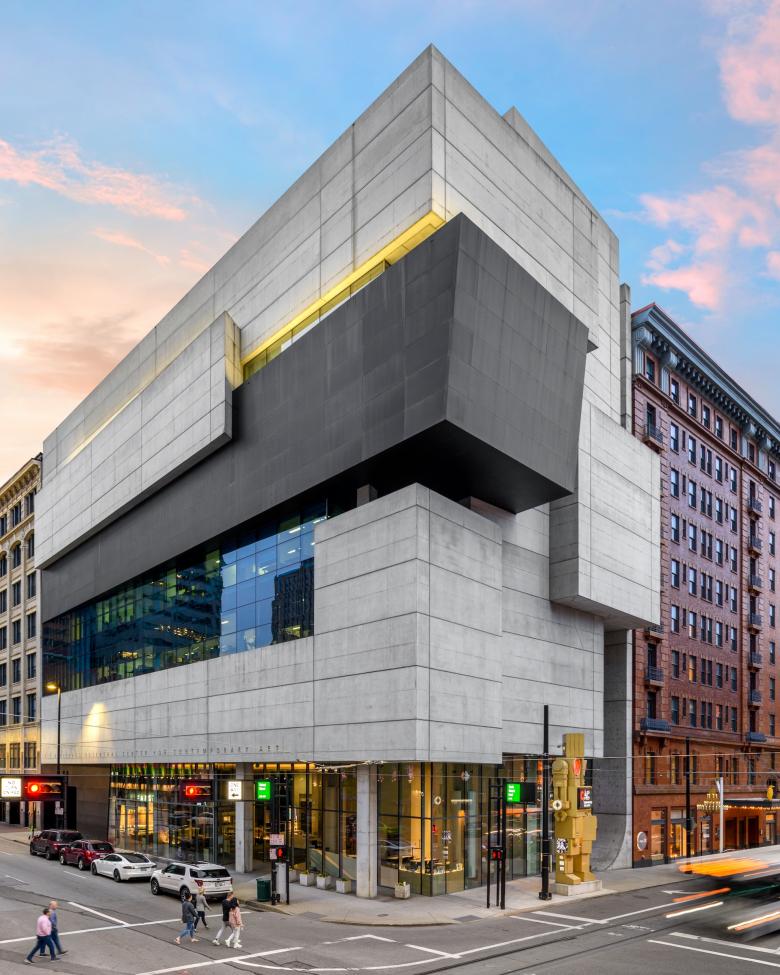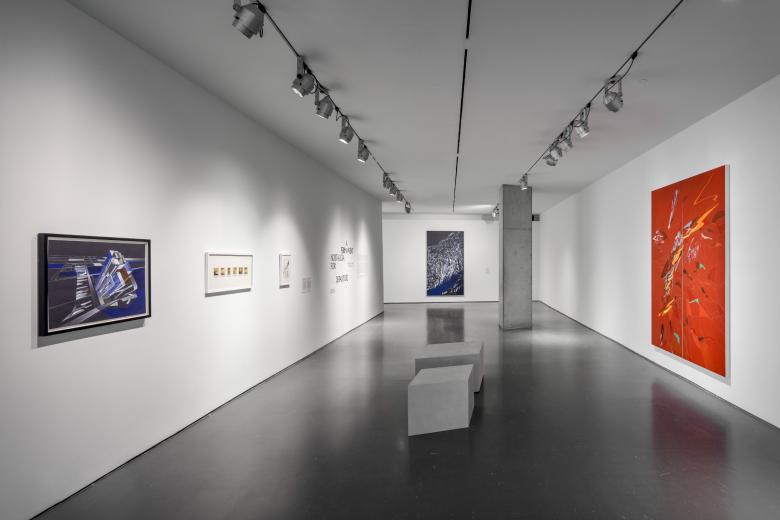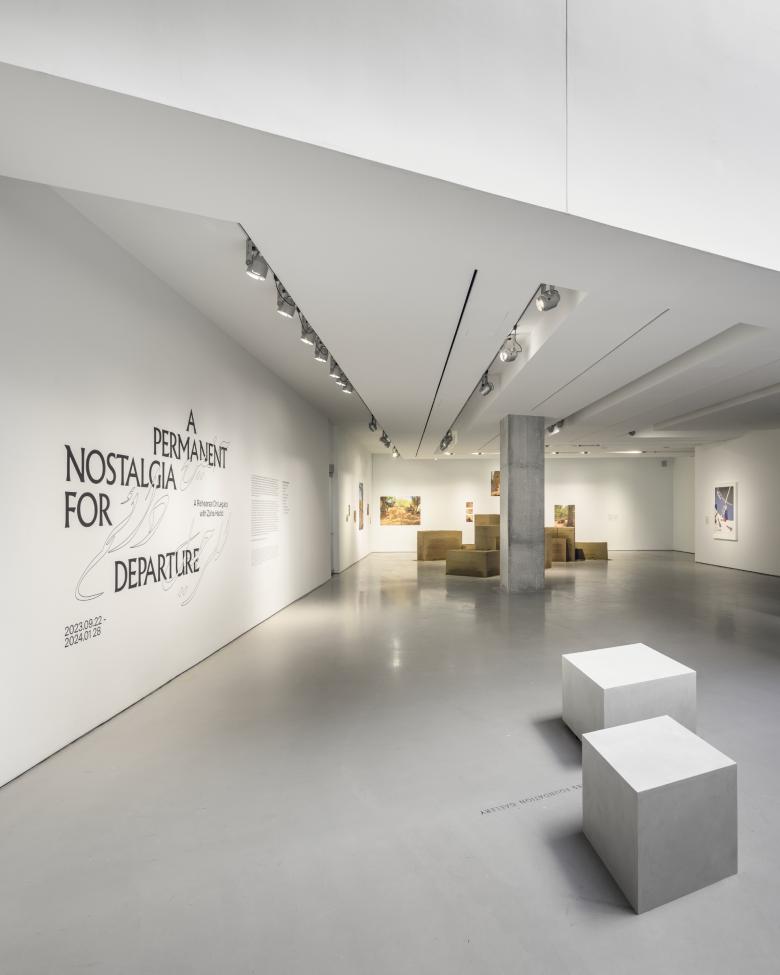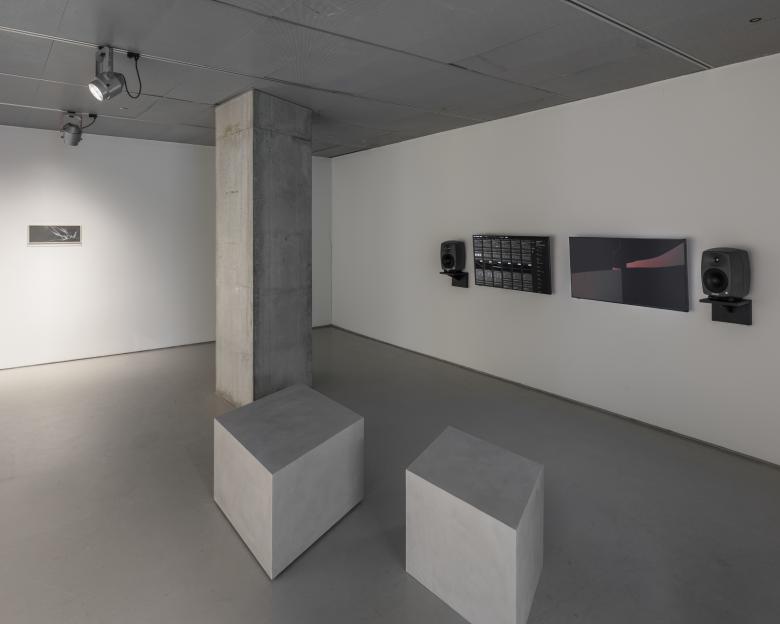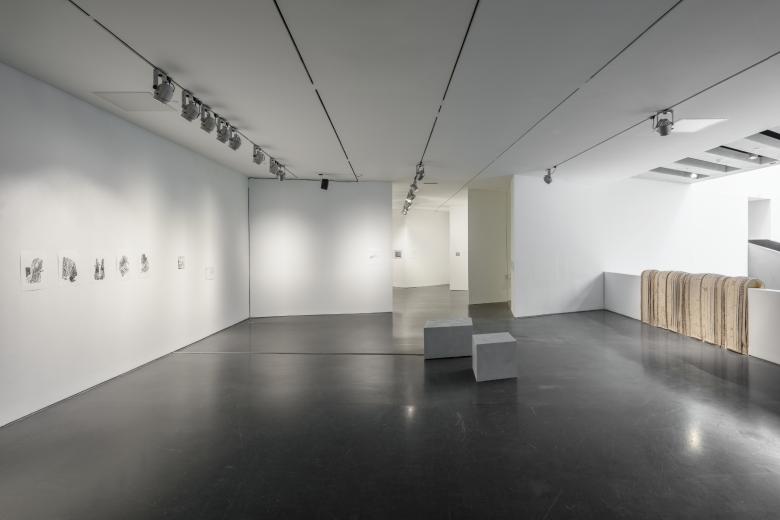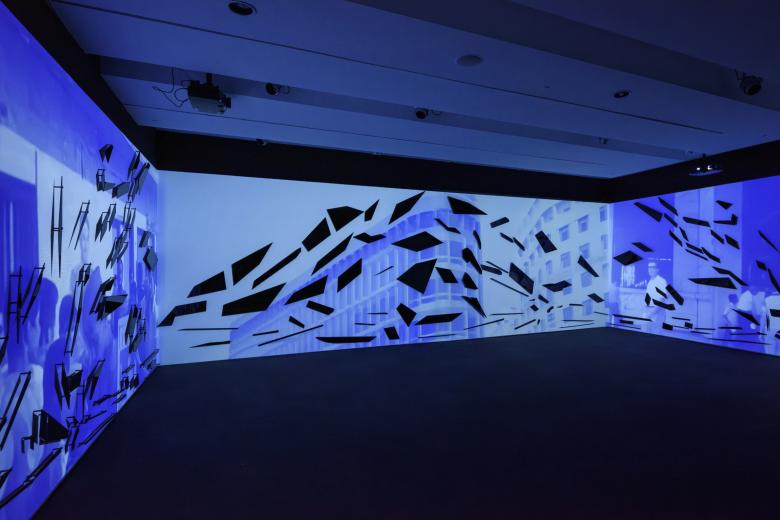'A Permanent Nostalgia for Departure' at the CAC
Zaha Hadid's Legacy in Cincinnati
A Permanent Nostalgia for Departure: A Rehearsal on Legacy with Zaha Hadid is on display at the Contemporary Arts Center in Cincinnati, Ohio, until January 28, 2024. The exhibition features artworks that engage directly with the 20-year-old building designed by Zaha Hadid, notably Hadid's first building in the United States and the first American museum designed by a woman.
At seven stories and 82,265 square feet (7,643 m2), The Lois and Richard Rosenthal Center for Contemporary Art, the full name of the building Zaha Hadid designed for the Contemporary Arts Center (CAC), is relatively small compared to other museums created in the wake of the Guggenheim Museum Bilbao. It is also quite small relative to the buildings near the intersection of Sixth Street and Walnut Street in downtown Cincinnati. Yet, Hadid's competition-winning design (she unanimously beat out Daniel Libeskind and Bernard Tschumi) makes a bold — one might even say aggressive — statement: “Imposing concrete and aluminum-clad volumes float effortlessly in a three-dimensional field of suspended gravity” is how Joseph Giovannini described it in Zaha Hadid – Space for Art, the book published shortly after the opening of the museum's new home in 2003.
Inside, Hadid's design is organized about the “Urban Carpet Wall” that ramps up from the lobby and extends up the side of the building opposite Sixth Street. The zigzagging stairs that ascend from the lobby are positioned adjacent to the wall, thereby pushing the galleries toward the facades. And while the galleries might resemble white cubes, they are far from generic: “‘Neutral space’ is a wishful oxymoron,” Hadid had said about the CAC when it opened, “All space is colored by individual memory and experience.” Today, seven years since Hadid's sudden death at the age of 65, her memory colors the experience of many who visit the CAC, a fact even more pronounced during A Permanent Nostalgia for Departure: A Rehearsal on Legacy with Zaha Hadid, the new exhibition guest curated by Maite Borjabad López-Pastor.
What's in a name? The exhibition's subtitle, A Rehearsal on Legacy with Zaha Hadid, is somewhat clear, but the main title less so. A Permanent Nostalgia for Departure directly refers to some words that poet Etel Adnan wrote about Hadid upon the opening of the Chanel Art Pavilion in Paris in 2011:
“Zaha Hadid's entire oeuvre is an invitation to take a trip. Hadid is a poet of forms and of the materials that give presence to these forms; one must admire them close up and from afar to discover, in this woman who built on solid rock, a permanent nostalgia for departure. Everything she made seems to always be the day before a departure, a permanent invitation to the imagination, and to the imaginary.”
So, López-Pastor asked the invited artists to “expand on Adnan's prompt and propose a take on Zaha Hadid's legacy — not as a conclusive overview, but rather as a point of departure full of possibilities and reflections.” In addition to displays of some of Hadid's instantly recognizable paintings (above), the exhibition features the following artists reflecting on “Hadid's architectural thinking as a starting point, as a source of knowledge that can be activated, transferred and evolved”:
- Rand Abdul Jabbar (b. Baghdad, 1990, currently lives and works in Abu Dhabi)
- Khyam Allami (b. Damascus, 1981, currently lives and works in Berlin)
- Emii Alrai (b. Blackpool, 1993, currently lives and works in Leeds)
- Hera Büyüktaşcıyan (b. Istanbul, 1984)
- Andrea Canepa (b. Lima, 1980, currently lives and works in Berlin)
- Civil Architecture Studio, founded by Hamed Bukhamseen (b. Kuwait City, 1991) and Ali Ismail Karimi (b. Manama, 1989)
- Dima Srouji (b. Nazareth, 1990, currently lives and works in London)
Visitors ascending to the fourth floor galleries first encounter the contribution by Rand Abdul Jabbar titled Tektōn (after Zaha, after Malevich). The title refers to Melevich's Tektonik, Hadid's 1977 graduation project at the Architectural Association in London, a project for a hotel on the Hungerford Bridge over the Thames. Hadid's red-and-blue painting can be seen on the wall (below) opposite Abdul Jabbar's clay-and-sand sculptures that echo the Suprematist forms that inspired Hadid. Though one may not associate compressed earth with bridging, part of Abdul Jabbar's sculpture does just that.
A Relational Music (rehearsal) is an 8.1 channel generative sound installation created by musician Khyam Allami in collaboration with Counterpoint (Samuel Diggins and Tero Parviainen). In Allami's words, the piece “resonates across two galleries to engage with the sonics of the space, Hadid's paintings and the other wonderful artists' works.”
Emii Alrai, in A Ceremony of Spectres, physically engages with Hadid's architecture, propping up rough sculptural pieces made out of foam, gypsum, and clay. Steel straps wrap one of the angular columns that punctuate most of the galleries in the building while pipes enable one piece to be suspended in the air, allowing it to serve like an archway.
The next two contributions can be seen in the photo above, a view of the double-height space on the fourth floor seen from the stair leading up to the fifth floor.
Above is Hera Büyüktaşcıyan's Like an Avalanche Started by a Gentle Push, whose form and media (industrial carpets) clearly recalls the “Urban Carpet Wall” of Hadid's building. The site-specific nature of the work is also clear, given how the sculpture navigates the double-height space, drawing the visitor's gaze to the gallery above and making them realize the exhibition continues upstairs.
Nearby is Between the Stumble and the Fall by Andrea Canepa, which at first glance feels like Hadid's colorful paintings rendered in fabric. Most interesting is the way Canepa uses the hanging fabric to soften the angles of Hadid's interiors, perhaps a further reference to the “Urban Carpet Wall” but also an allusion to the way Hadid's architecture moved post-CAC from angular, aggressive forms to smooth surfaces with the input of longtime collaborator and ZHA principal Patrik Schumacher.
The fifth-floor gallery hinted at by the carpeted installation of Büyüktaşcıyan, which wraps over the guardrail in the above photo, is where the paintings by Zaha Hadid, shown earlier, are found. Adjacent to them is the contribution by Civil Architecture, the studio founded by Hamed Bukhamseen and Ali Ismail Karimi. Site Notes is a multimedia installation that is most interesting for the way the small trapezoidal gallery is made smaller but actually gains wall space through the introduction of angular walls.
The last artist in this alphabetical-order look at A Permanent Nostalgia for Departure is Dima Srouji, whose Dithyramb is an immersive video installation projected on multiple walls. Static shapes that appear dynamic, almost Hadid-like, are fixed in front of the walls, casting shadows across the moving images. One account says the installation “allows multiple cities to take center stage as a meditation on Zaha’s life, imagining what her home videos might have felt like during what she calls the happiest years of her life.”
